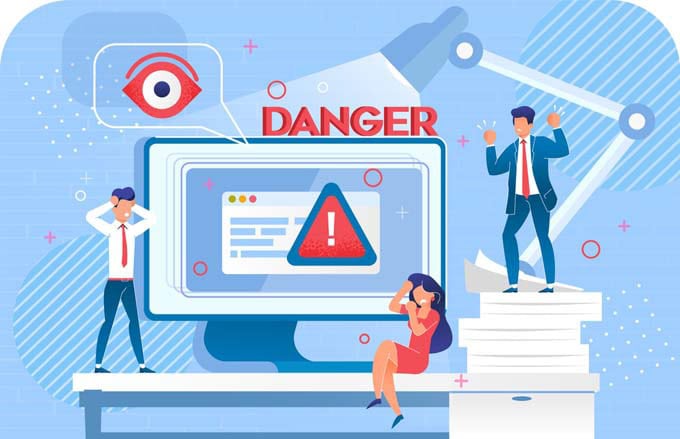And nothing works anymore!
Without the Internet, many things in the world would be upside down. In Switzerland, too. Experts say that a nationwide or even global failure of the Internet is hardly possible. But even isolated interruptions can have serious consequences.

Vust a few years ago, Zumsteg Druck AG in Frick AG had an unpleasant experience with the dangers of the Internet. "A hacker attack practically paralyzed our operations," says Sales Manager Stefan Leimgruber. The Internet, and thus the mail server as well as the online shop, stopped working for two days. The orders could not be processed as desired. "This attack caused us damage or a reduction in turnover in the region of a double-digit percentage", describes Stefan Leimgruber. The Internet plays an important role for the company, which now operates three online portals: flyeronline.ch, buchmodul.ch and swiboo.ch. "As an SME with ten employees, a shorter or even longer internet outage would have fatal consequences for us," says Stefan Leimgruber.
Two thirds of China without a grid
A nightmare in the Internet age was experienced by millions of people in China two years ago when a massive Internet outage suddenly left them without access to websites, social media and other online services. The outage lasted more than two hours. After that, most websites were accessible again. According to the Xinhua news agency, a hacker attack may have been the cause of this unusual interruption, which affected around two-thirds of the Chinese internet. The DNS-Charger malware also caused a great stir in the USA in 2012. An internet outage was feared. Internet providers upgraded their service hotlines. The Trojan caused infected computers to contact the hacker's computers instead of the normal DNS servers. According to FBI estimates, more than 570,000 computers were infected with the malware.
Rather unlikely, but ...
How great is the danger of a major failure of the Internet today? For Bernhard Plattner, Professor Emeritus of Computer Engineering at ETH Zurich and former Head of the Institute for Technical Communication and Communication Networks, a total failure of the Internet is rather unlikely. "The failure of Swisscom's infrastructure alone, for example, would not paralyse the Internet in Switzerland. In such a case, other providers would not necessarily be affected." More critical would be a failure at the so-called "Internet Exchange Points" (IXP), where the various Internet providers are linked together for data exchange. If there were a defect here, several providers would be affected - but not the entire Internet, emphasizes Bernhard Plattner. "The topography of the Internet consists of grown structures with different connections. This redundancy within the system cannot simply be switched off." The danger situation was more problematic in 2002 and 2007: "At that time, there were attacks on the DNS, which caused some DNS servers to fail briefly. That was a wake-up call for those responsible," recalls the ETH professor. At that time, the DNS (Domain Name System) had (only) 13 servers worldwide, which connected the countless computer networks. Today, 129 servers are in use around the world to direct users' web requests to the right web servers. According to Bernhard Plattner, an Internet outage caused by attacks on the DNS is therefore rather unlikely. According to Bernhard Plattner, a wave of attacks in November and December 2015 was largely ineffective.
Multiple dangers
The Internet connects people, machines, technology and business. However, this harbours dangers for everyone connected to the network. "The opportunities, but also the resulting threats, are the result of countless technical innovations and the applications and services that build on them," says Stefan Frei, Security Architect at Swisscom and
GPS signals are particularly sensitive to interference.
Author of the dossier "Cyber Security: the current threat situation and its development". In other words, the origins of Internet-related threats are to be found in the constant development of new technologies and their application and dissemination in society. The more the Internet is networked and integrated into society, the more new and sometimes surprising ways of interaction emerge for the threat situation. For example, small or well-intentioned interventions in one part of the system could lead to serious and unforeseen effects in a completely different part of the Internet. Stefan Frei increasingly expects small errors or attacks to cause surprising damage through cascading.
No power, no internet
Prolonged power cuts are also possible reasons for a breakdown in internet communication. Ruedi Rytz, Head of the Transport and Information and Communication Technologies (ICT) Business Units at the Federal Office for National Economic Supply (FONES), does not rule out the possibility that individual services, such as electricity and water supply, could be attacked by hackers via the internet. GPS signals, which are used to determine locations, are apparently particularly sensitive to interference. In San Diego (USA) in 2007, emergency pagers, mobile phones, traffic management systems and ATMs went down citywide for two hours after a GPS signal failure caused by unintentional "jamming". "The dependencies on GPS to synchronize many processes have only grown since this event. Countless services can be affected by a failure," says Stefan Frei from Swisscom.
Great economic damage
What are the consequences of a regional, national or even international Internet outage? The spread of the Internet alone speaks for the consequences of a failure: Today, more than three billion people have access to the Internet, which corresponds to 42 percent of the world's population. The proportion of mobile use is rising steadily. "A failure of the Internet inevitably triggers a major economic loss," says Peter Grütter, President of the Swiss Telecommunications Association (asut). Many companies depend on the Internet and e-mail. But public services such as electricity and water supply or transport are also networked via the Internet today and would therefore be affected in the event of a failure. However, Peter Grütter distinguishes between private networks and the public Internet: Large companies, hospitals, electricity suppliers, etc. often have their own secure network infrastructures. The amount of damage depends on the duration and scope of an Internet outage. "The larger the affected area, the higher the overall damage," says the asut president.
Continuously improve grid stability
The Federal Office for National Economic Supply has been dealing with the dangers associated with the Internet since 1997, as Ruedi Rytz explains. This includes, on the one hand, recognising possible dangers in advance and reacting to them. The Confederation also conducts regular exercises to prepare for scenarios. Secondly, efforts are being made to constantly improve the stability of the network. In the event of a collapse of the Swisscom network, the
"Today, over three billion people have access to the Internet."
it is important to be able to switch to other providers in Switzerland in order to maintain coverage, says Peter Grütter of asut. Cable supply can also be used as an alternative for telecommunications, he adds. Each individual company can protect itself against attacks from Trojans and hackers. According to Bernhard Plattner of ETH Zurich, this also includes a backup concept that is specifically geared towards cyber attacks. Unfortunately, many Swiss SMEs are inadequately protected, according to a survey by the University of St.Gallen. According to the study, well over 90 percent of all companies were affected by hacker attacks last year. Ruedi Rytz from BWL assumes that dependence on the virtual world will continue to increase in the future, as will the stability of the Internet.









